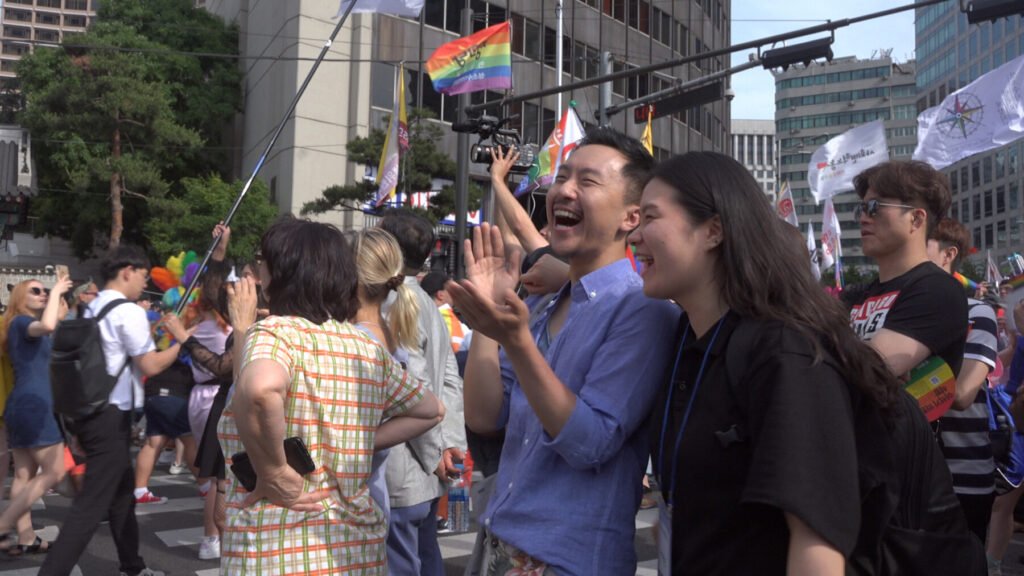
The director narrates the film like Sandi Tan’s “Shirkers” and it is as private as Yan Zhexuan’s 2020 documentary “Taiwan Equals Love” covering queerness in East Asia, hence the filmmaker embraces subjective objectivity that Haraway advances on her famous situated knowledges article. She does not lie about what she feels, and so, she says it out loud that she wonders if she would have been on the other side of queer protests if Kang-won had not been his friend. The English-speaking Christian counter-protesters at the Seoul Queer Festival are seen to cry out for repentance; Ah-hyun hesitantly chimes in wondering whether this is a joke or not. However, Kang-won doesn’t get himself saved in a country where almost one-third of its population practices Christianity. That isn’t correct or wrong, and there isn’t just one truth either. Being gay may be a sin but being a Christian homosexual man is still possible.
In the estranging cradle of toxic masculinity of a military base in Germany, as Kang-won is excitedly promoted to U.S. army sergeant, Ah-hyun is desolate and lost but safely swaddled among her Christian brethren in Korea. “For this we say unto you by the word of the Lord, that we which are alive and remain unto the coming of the Lord shall not prevent them which are asleep,” murmur worshippers gathered in a circle. She skillfully navigates between their opposing lives with no story whiplash, asking us to have faith in her talent for merging both, as if it was a twenty something year old Korean life seen through two mirrors.
However, like any attempt at romanticization, putting Kang-won on a pedestal must come crashing down. Ah-hyun dreams of having all the vulnerabilities and confidences that her best friend has but discovers his emotional unavailability as he sobs: “Who can I show this side to? My boyfriend? God?” Thus, coming out appears merely as an obstacle rather than a larger journey towards selfhood in modern times where performativity suffocates manliness and Western society implants self-reliance as a doctrine into every citizen’s head.
Paulo Coelho’s “The Alchemist” is hanging low over Kang-won as he renounces his Korean citizenship for a future (and citizenship) in the United States, only to later return to Korea after he was discharged from the U.S. army because of depression looking for himself. Nevertheless, his rude denial of heteropatriarchal nationalism on his way out clips him in the shoulder because he cannot get a job visa in Korea because he did not serve in its military since it’s mandatory for all men. It is indeed ironic when one chooses individualism against collectivist society and then suffers merciless rejection when desiring so much to come back into its still warm boundaries. Even though “Queer My Friends” says we should be true to ourselves, it also suggests that we can never be our true selves.
Ah-hyun hesitates to pick up the mantle of reflexive documentary form throughout the movie, distancing herself from her identity as a woman who is behind the camera. Song Kong-seok’s cinematography does serve this purpose well enough, but it deserves much more especially in times of hyper-personal revelation. The film has some moments where we have been distanced too far away from its subjects by the camerawork and this gives it a feeling like a vlog. Ah-hyun goes even further than that when she uses mirror shots to directly turn the camera on herself while holding her video-camera and RØDE mic aimed at you. What remains is “Queer My Friends” B-roll footage of urbanity that eventually grounds it within the daily-life routines’ trivialities.
“What can we do when people don’t accept us for who we are?” Ah-hyun wonders, accepting that she cannot answer this question by herself. This goes beyond homosexuality in Korea or anywhere else in the world. Kang-won switches from Korean to American military citizenship and acting to musical theater after he came out while Ah-hyun has remained in Seoul and went into movies. However, Kang-won’s influence quietly yet deeply infiltrates her life without her knowledge making her face up to queerness as other than self-identity: as a form of speech and an approach to life. The filmmaker herself is entirely inward-looking but not indulgent often enough. The complete unsettling of her own biases around queer existence, hardship, and joy are not within the confines of this story.
For more movies like “Queer My Friends” visit on solarmovie.







